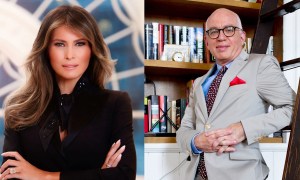First lady Michelle Obama looks absolutely stunning for the cover of New York Times Style Magazine.
The first lady was featured with four heart-felt thank you letters to
acknowledge her legacy and for confidently changing the course of
American history. The thank you letters are from: CHIMAMANDA NGOZI
ADICHIE, GLORIA STEINEM, JON MEACHAM and RASHIDA JONES. Read
Chimamanda’s after the cut…
By Chimamanda Ngozi Adichie:
She had rhythm, a flow and swerve, hands slicing air, body weight moving
from foot to foot, a beautiful rhythm. In anything else but a black
American body, it would have been contrived. The three-quarter sleeves
of her teal dress announced its appropriateness, as did her matching
brooch. But the cut of the dress scorned any “future first lady”
stuffiness; it hung easy on her, as effortless as her animation. And a
brooch, Old World style accessory, yes, but hers was big and ebulliently
shaped and perched center on her chest. Michelle Obama was speaking. It
was the 2008 Democratic National Convention. My anxiety rose and
swirled, watching and willing her to be as close to perfection as
possible, not for me, because I was already a believer, but for the
swaths of America that would rather she stumbled.
She first appeared in the public consciousness, all common sense and
mordant humor, at ease in her skin. She had the air of a woman who could
balance a checkbook, and who knew a good deal when she saw it, and who
would tell off whomever needed telling off. She was tall and sure and
stylish. She was reluctant to be first lady, and did not hide her
reluctance beneath platitudes. She seemed not so much unique as true.
She sharpened her husband’s then-hazy form, made him solid, more than
just a dream.
But she had to flatten herself to better fit the mold of first lady. At
the law firm where they met before love felled them, she had been her
husband’s mentor; they seemed to be truly friends, partners, equals in a
modern marriage in a new American century. Yet voters and observers,
wide strips of America, wanted her to conform and defer, to cleanse her
tongue of wit and barb. When she spoke of his bad morning-breath, a
quirky and humanizing detail, she was accused of emasculating him.
Because she said what she thought, and because she smiled only when she
felt like smiling, and not constantly and vacuously, America’s cheapest
caricature was cast on her: the Angry Black Woman. Women, in general,
are not permitted anger — but from black American women, there is an
added expectation of interminable gratitude, the closer to groveling the
better, as though their citizenship is a phenomenon that they cannot
take for granted.
Continue reading the main story
“I love this country,” she said to applause. She needed to say it — her
salve to the hostility of people who claimed she was unpatriotic because
she had dared to suggest that, as an adult, she had not always been
proud of her country.
Of course she loved her country. The story of her life as she told it
was wholesomely American, drenched in nostalgia: a father who worked
shifts and a mother who stayed home, an almost mythic account of
self-reliance, of moderation, of working-class contentment. But she is
also a descendant of slaves, those full human beings considered human
fractions by the American state. And ambivalence should be her
birthright. For me, a foreign-raised person who likes America, one of
its greatest curiosities is this: that those who have the most reason
for dissent are those least allowed dissent.
Michelle Obama was speaking. I felt protective of her because she was
speaking to an America often too quick to read a black woman’s
confidence as arrogance, her straightforwardness as entitlement.
She was informal, colloquial, her sentences bookended by the word “see,”
a conversational fillip that also strangely felt like a mark of
authenticity. She seemed genuine. She was genuine. All over America,
black women were still, their eyes watching a form of God, because she
represented their image writ large in the world.
Her speech was vibrant, a success. But there was, in her eyes and
beneath her delivery and in her few small stumbles, a glimpse of
something somber. A tight, dark ball of apprehension. As though she
feared eight years of holding her breath, of living her life with a
stone in her gut.
Eight years later, her blue dress was simpler but not as eager to be
appropriate; its sheen, and her edgy hoop earrings, made clear that she
was no longer auditioning.
Her daughters were grown. She had shielded them and celebrated them, and
they appeared in public always picture perfect, as though their careful
grooming was a kind of reproach. She had called herself mom-in-chief,
and cloaked in that nonthreatening title, had done what she cared about.
She embraced veterans and military families, and became their listening
advocate. She threw open the White House doors to people on the margins
of America. She was working class, and she was Princeton, and so she
could speak of opportunity as a tangible thing. Her program Reach Higher
pushed high schoolers to go further, to want more. She jumped rope with
children on the White House grounds as part of her initiative to combat
childhood obesity. She grew a vegetable garden and campaigned for
healthier food in schools. She reached across borders and cast her light
on the education of girls all over the world. She danced on television
shows. She hugged more people than any first lady ever has, and she made
“first lady” mean a person warmly accessible, a person both normal and
inspirational and a person many degrees of cool.
She had become an American style icon. Her dresses and workouts. Her
carriage and curves. Toned arms and long slender fingers. Even her
favored kitten heels, for women who cannot fathom wearing shoes in the
halfway house between flats and high heels, have earned a certain
respect because of her. No public figure better embodies that mantra of
full female selfhood: Wear what you like.
It was the 2016 Democratic Convention. Michelle Obama was speaking. She
said “black boy” and “slaves,” words she would not have said eight years
ago because eight years ago any concrete gesturing to blackness would
have had real consequences.

















